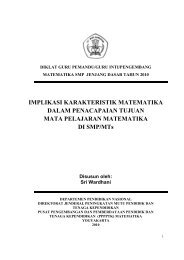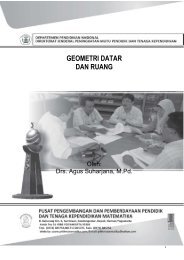25 Biggest Mistakes Teachers Make and How to Avoid Them
25 Biggest Mistakes Teachers Make and How to Avoid Them
25 Biggest Mistakes Teachers Make and How to Avoid Them
Create successful ePaper yourself
Turn your PDF publications into a flip-book with our unique Google optimized e-Paper software.
134 Personality <strong>and</strong> Professionalism<br />
The problem in this scenario is<br />
that the teacher treated a<br />
young child’s accident as if it was a<br />
misdemeanor that warranted shame<br />
<strong>and</strong> public exhibition. Having the<br />
child clean up the mess, carry the<br />
trashcan containing the soggy mess,<br />
<strong>and</strong>, as a finale, take the trashcan out<br />
of the front door was a demeaning,<br />
covert form of punishment.<br />
The insensitive teacher had no<br />
empathy for the child <strong>and</strong> made a<br />
conscious effort <strong>to</strong> make the situation<br />
obvious. Perhaps the motive for<br />
this less-than-empathetic response<br />
was that the teacher felt she could<br />
not let the accident go unnoticed<br />
SCENARIO 16.5<br />
Eye <strong>to</strong> Swollen Eye<br />
because it may encourage others <strong>to</strong><br />
do the same.<br />
Empathic teachers would<br />
re spond <strong>to</strong> the child’s accident with<br />
minimal attention <strong>and</strong> class interruption.<br />
They would send for the jani<strong>to</strong>r<br />
<strong>to</strong> do a quick clean up while they<br />
directed their students’ attention <strong>to</strong><br />
other relevant instructional matters.<br />
Students would learn the valuable<br />
lesson that accidents happen <strong>and</strong><br />
maintaining dignity is a better<br />
approach <strong>to</strong> h<strong>and</strong>ling an accident<br />
than is invoking shame. Children<br />
should not be sent <strong>to</strong> center stage for<br />
unintentional acts of behavior that<br />
are better known as accidents.<br />
My PE teacher completely ignored me when I <strong>to</strong>ld her my eye was bitten by an ant <strong>and</strong><br />
was swollen. By the time I got back <strong>to</strong> regular class, my eye was swollen shut <strong>and</strong> I<br />
couldn’t see. The main thing I was mad about was that she completely ignored me <strong>and</strong><br />
didn’t even look at me.<br />
The teacher in this scenario<br />
didn’t bother <strong>to</strong> look at a student<br />
who was complaining of an eye<br />
injury. This reckless act of indifference<br />
could have endangered the in -<br />
jured student. If the teacher had at<br />
least made eye contact, she could<br />
have readily seen that the student’s<br />
eye was swelling rapidly. The student<br />
could have had an allergic reaction<br />
or serious injury <strong>to</strong> the eye.<br />
Prompt attention <strong>to</strong> an injury is necessary<br />
<strong>to</strong> protect the well-being of<br />
the child. This teacher’s lack of<br />
response borders on negligence.<br />
Prudent teachers investigate all<br />
student complaints of injury imme -<br />
diately. Although some complaints<br />
may be trivial, <strong>to</strong> ignore them<br />
may risk ignoring a serious or lifethreatening<br />
injury. Sometimes just<br />
acknowledging students’ injuries<br />
makes them feel better. It’s human<br />
nature <strong>to</strong> want <strong>to</strong> tell someone where<br />
it hurts. Good teachers are willing <strong>to</strong><br />
listen.





